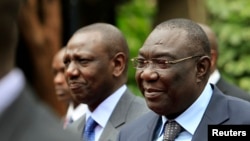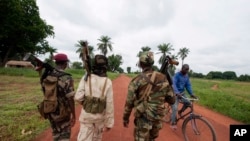YAOUNDE —
Central African heads of state are meeting in Chad on Monday to discuss the humanitarian crisis in Central African Republic. The summit follows a special U.N. mission to the CAR that confirmed the dire situation faced by hundreds of thousands of civilians.
The U.N. refugee agency says violence in the CAR has uprooted more than 220,000 people in the past 10 months, with 60,000 seeking refuge in surrounding countries.
Fifteen-hundred of them went to Nadunge, a small locality in eastern Cameroon. But the UNHCR's representative in Cameroon, Ndeye Ndiougue Ndour, says the town could not meet their needs.
“They decided to leave the camp to go and stay in Borogo," Ndour said. "Eighty percent of them are the youth. More than 70 percent need to go to school but we don’t have facilities in Nadunge.”
Earlier this month, the United Nations Security Council unanimously approved a resolution aimed at stabilizing the Central African Republic. The country has experienced several months of violence and chaos since the rebel movement Seleka overthrew President Francois Bozize.
A special envoy, Senegalese-born General Boubacar Gaye, visited Central African countries to encourage them to apply the U.N. resolution.
"The first thing we expect is readiness on the part of all countries of the sub-region, that is the purpose of my visit," said Gaye. "Then African forces should be deployed as soon as possible. Bangui has been secured to permit forces to be present. Lastly those who are in charge of the transition should be able to put a stop to impunity and a legal framework should be instituted so that all crimes committed should not go unpunished," he said.
CAR's self-proclaimed president, Michel Djotodia, says his government is making efforts to stop the activities of his opponents, which he describes as robbers.
"We can dislodge those bandits and that is what we will be doing," said Djotodia. "We gave them a maximum period of three months to negotiate and they are aware. We know where those bandits are. We have decided to fight them and we shall fight them.”
Heads of state of the Central African Economic and Monetary Community (CEMAC) are meeting Chad this week to examine ways of handling the crisis.
The president of Equatorial Guinea, Theodoro Obiang Nguema, suggested that CEMAC should not accept the U.N.-proposed humanitarian intervention to solve CAR's problems.
"We are capable of solving our internal problems with means from African countries," he said. Africa is the only continent where people come to exploit natural resources in the name of solving problems, as it has always been the case from the colonial era, said Obiang.
The United Nations and the African Union have singled out Seleka fighters as being responsible for the wave of killings, rapes, torture, lootings, and other crimes that have prompted so many CAR residents to flee their homes over the past several months.
Michel Djotodia said he already declared the rebel group's existence illegal.
“We are going to train soldiers of the former Seleka because to us, Seleka no longer exists. We just have the Central African forces. We are going to transfer secretaries to all army barracks to make a census of those who accept to be part of the disarmament process. It is only there after that we shall organize recruitment into a republican army.”
It is expected that after the meeting in N'Djamena, leaders of Central African states will deploy more troops to the CAR.
The U.N. refugee agency says violence in the CAR has uprooted more than 220,000 people in the past 10 months, with 60,000 seeking refuge in surrounding countries.
Fifteen-hundred of them went to Nadunge, a small locality in eastern Cameroon. But the UNHCR's representative in Cameroon, Ndeye Ndiougue Ndour, says the town could not meet their needs.
“They decided to leave the camp to go and stay in Borogo," Ndour said. "Eighty percent of them are the youth. More than 70 percent need to go to school but we don’t have facilities in Nadunge.”
Earlier this month, the United Nations Security Council unanimously approved a resolution aimed at stabilizing the Central African Republic. The country has experienced several months of violence and chaos since the rebel movement Seleka overthrew President Francois Bozize.
A special envoy, Senegalese-born General Boubacar Gaye, visited Central African countries to encourage them to apply the U.N. resolution.
"The first thing we expect is readiness on the part of all countries of the sub-region, that is the purpose of my visit," said Gaye. "Then African forces should be deployed as soon as possible. Bangui has been secured to permit forces to be present. Lastly those who are in charge of the transition should be able to put a stop to impunity and a legal framework should be instituted so that all crimes committed should not go unpunished," he said.
CAR's self-proclaimed president, Michel Djotodia, says his government is making efforts to stop the activities of his opponents, which he describes as robbers.
"We can dislodge those bandits and that is what we will be doing," said Djotodia. "We gave them a maximum period of three months to negotiate and they are aware. We know where those bandits are. We have decided to fight them and we shall fight them.”
Heads of state of the Central African Economic and Monetary Community (CEMAC) are meeting Chad this week to examine ways of handling the crisis.
The president of Equatorial Guinea, Theodoro Obiang Nguema, suggested that CEMAC should not accept the U.N.-proposed humanitarian intervention to solve CAR's problems.
"We are capable of solving our internal problems with means from African countries," he said. Africa is the only continent where people come to exploit natural resources in the name of solving problems, as it has always been the case from the colonial era, said Obiang.
The United Nations and the African Union have singled out Seleka fighters as being responsible for the wave of killings, rapes, torture, lootings, and other crimes that have prompted so many CAR residents to flee their homes over the past several months.
Michel Djotodia said he already declared the rebel group's existence illegal.
“We are going to train soldiers of the former Seleka because to us, Seleka no longer exists. We just have the Central African forces. We are going to transfer secretaries to all army barracks to make a census of those who accept to be part of the disarmament process. It is only there after that we shall organize recruitment into a republican army.”
It is expected that after the meeting in N'Djamena, leaders of Central African states will deploy more troops to the CAR.





